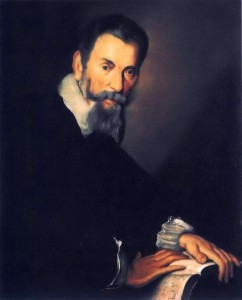Monteverdi, Confitebor tibi Domine
 Claudio Monteverdi (1567-1643) had considerable success as both a Renaissance and Baroque composer. Those labels would come into use only later to describe his transition from one stylistic approach to another, but it was clear at the time that a new musical style had emerged around 1600. And Monteverdi, already well-known for composing in the old style, thrust himself in the forefront of the new style, dubbed at the time the Stile moderna or seconda practica.
Claudio Monteverdi (1567-1643) had considerable success as both a Renaissance and Baroque composer. Those labels would come into use only later to describe his transition from one stylistic approach to another, but it was clear at the time that a new musical style had emerged around 1600. And Monteverdi, already well-known for composing in the old style, thrust himself in the forefront of the new style, dubbed at the time the Stile moderna or seconda practica.
The old style, or prima practica, reveled in the complex polyphony of the late Renaissance in which multiple voices of equal importance combined to create a rich tapestry of sound. The new style gave prominence to a single melodic line, freer and more expressive, that was supported by sparse instrumental harmonies. The new style had much in common with our modern emphasis on melody with harmonic accompaniment.
Beginning in 1590, Monteverdi served as a court musician in Mantua primarily under the direction of Flemish musician Giaches de Wert, an important Renaissance composer but also one who laid the groundwork for Monteverdi’s move into the new style. In 1600, this new style, and Monteverdi’s pieces in particular, was criticized by the prominent theorist Giovanni Maria Artusi. Something of a public debate ensued, which ultimately benefited Monteverdi. Shortly afterward, in 1607, Monteverdi would write the groundbreaking work L’Orfeo, generally considered to be the first opera. And what we today call the Baroque era was off and running.
Monteverdi was appointed maestro at the basilica of San Marco in Venice in 1613. The level of choral singing at this basilica reportedly was among the finest in Europe.
Confitebor tibi appears in a collection of Monteverdi’s sacred works published in 1640-41 called Selva Morale e Spirituale (Moral and Spiritual Forest). The collection included a complete Mass, Marian hymns, Italian madrigals, and Psalm settings. Confitebor tibi sets the text of Psalm 111.



